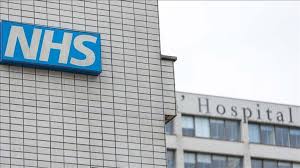
Breaking News
 Mental Health Detentions and the Criminalization of Dissent
Mental Health Detentions and the Criminalization of Dissent
 Marlow: Investigation Season--Lawfare Judge Boasberg's Russiagate Connection Revealed
Marlow: Investigation Season--Lawfare Judge Boasberg's Russiagate Connection Revealed
 PM Viktor Orbán on Hungary's Relationship with the EU
PM Viktor Orbán on Hungary's Relationship with the EU
 Hurricane Erin rapidly intensifies into catastrophic Category-5 monster storm:
Hurricane Erin rapidly intensifies into catastrophic Category-5 monster storm:
Top Tech News
 Chinese Scientists Produce 'Impossible' Steel to Line Nuclear Fusion Reactors in Major Break
Chinese Scientists Produce 'Impossible' Steel to Line Nuclear Fusion Reactors in Major Break
 1,000 miles: EV range world record demolished ... by a pickup truck
1,000 miles: EV range world record demolished ... by a pickup truck
 Fermented Stevia Extract Kills Pancreatic Cancer Cells In Lab Tests
Fermented Stevia Extract Kills Pancreatic Cancer Cells In Lab Tests
 3D printing set to slash nuclear plant build times & costs
3D printing set to slash nuclear plant build times & costs
 You can design the wheels for NASA's next moon vehicle with the 'Rock and Roll Challenge
You can design the wheels for NASA's next moon vehicle with the 'Rock and Roll Challenge
 'Robot skin' beats human reflexes, transforms grip with fabric-powered touch
'Robot skin' beats human reflexes, transforms grip with fabric-powered touch
 World's first nuclear fusion plant being built in US to power Microsoft data centers
World's first nuclear fusion plant being built in US to power Microsoft data centers
 The mitochondria are more than just the "powerhouse of the cell" – they initiate immune...
The mitochondria are more than just the "powerhouse of the cell" – they initiate immune...
 Historic Aviation Engine Advance to Unlock Hypersonic Mach 10 Planes
Historic Aviation Engine Advance to Unlock Hypersonic Mach 10 Planes
 OpenAI CEO Sam Altman Pitches Eyeball-Scanning World ID to Bankers
OpenAI CEO Sam Altman Pitches Eyeball-Scanning World ID to Bankers
The Collapse of Britain's National Health Service

It's a poorly-kept secret that Britain's National Health Service (NHS) has faced crisis after crisis. But the latest scandal over 3 million "unseen patients" may be its worst yet. In fact, this omnicrisis is worsened by the fact that barely anyone is speaking about it.
Throughout the 2000s, headlines warned of an overwhelmed and underfunded healthcare system that was systemically failing, from facing "another winter of crisis" and bed shortages to a 2005 scandal forecasting that half of all NHS trusts would face hiring freezes due to a "cash crisis."
These problems spilled over into the 2010s in the wake of the financial crash, worsened by the newly-elected Conservative–Liberal Democrat coalition government's goal of cutting public services across the board. The austerity period saw a continued rise in NHS funding, along with warnings in 2015, and again in 2019, that the NHS was on the "brink of collapse."
The Covid pandemic highlighted the perilous condition of Britain's healthcare system. Some critics highlighted the apparent lack of funding, while others claimed that the crisis revealed the strength of the NHS in being able to respond under pressure.
Regardless of whether Covid revealed the contradictions or the strength underpinning the NHS, it has left a legacy of exploding waiting lists and what feels like a health service unfit for purpose.
The British Social Attitudes' survey from 2024 revealed just 21% of respondents were satisfied with the state of the NHS, while 59% were dissatisfied. Perhaps more importantly, the majority want more funding for the NHS (69% say too little is spent) and think that the NHS is spending inefficiently (51%).
The latest NHS statistics revealed that 6.23 million people are on the waiting list, meaning they have been seen by a General Practitioner (GP) and been referred for treatment of some kind. A situation in which nearly 10% of the population is facing long waits is a damning indictment of the system.
Yet this is not the worst of it. The most terrifying finding from the survey is that 48% of those 6.23 million—approximately 2.99 million people—have not been seen by anyone at all. As Rachel Power of the Patients Association said, "The scale is staggering, as nearly half of all patients on a waiting list haven't been seen by anyone. That's not a healthcare service; that's a breakdown."



